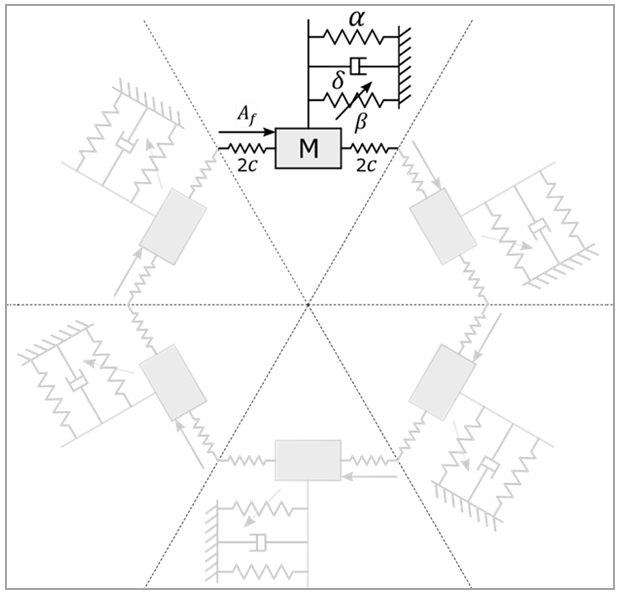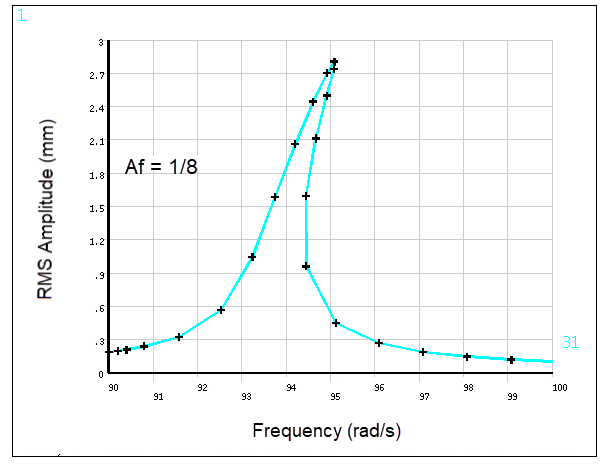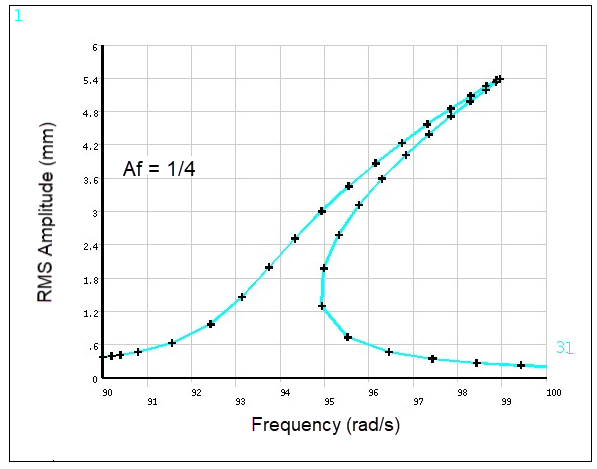VM319
VM319
Nonlinear Harmonic Analysis of a Cyclic Chain of
Oscillators
Overview
| Reference: | Grolet, A. & Thouverez, F. (2011). Vibration analysis of a nonlinear system with cyclic symmetry. Journal of Engineering for Gas Turbines and Power, 133 (2). |
| Analysis Type(s): | Mode-Superposition Harmonic Analysis (ANTYPE = 3) |
| Element Type(s): |
Spring-Damper Elements (COMBIN14) Structural Mass Elements (MASS21) User-Defined Element (USER300) |
| Input Listing: | vm319.dat |
Test Case
As shown in the figure below, a disk with blades that can undergo large deformation is approximated by a cyclic chain of six linear-cubic oscillators linked by linear springs. A harmonic force is applied on each sector so that each oscillator is governed by the following equation:
(319–1) |
where is the displacement of the kth oscillator
and
is the excitation frequency. The parameters are defined in the
following table.
| Material Properties | Loading |
|---|---|
|
|
|
Analysis Assumptions and Modeling Notes
Only one sector is modeled, and cyclic constraint equations on the low and high edges of the sector are created with the multistage cyclic symmetry procedure (MSOPT and CECYCMS commands). The inter-sector spring of stiffness c is split into two springs (COMBIN14) of stiffness 2*c in order to apply the cyclic CEs. Inside the sector, the linear oscillator is modeled by COMBIN14 and a unit mass MASS21. The nonlinear spring is created using a user-defined element (USER300).
The model is solved using the harmonic balance method with three harmonics (HROPT ,HBM,3) using a frequency range from 90 to 100 Hz. The root mean square amplitude of the displacement is obtained for each calculated frequency by combining the different harmonics displacements.
Only cyclic harmonic index 0 response is excited, so the displacement amplitudes of all the masses are the same.
Results Comparison
The maximum amplitude and the corresponding frequency for two different amplitudes of excitation Af are compared against numerical results from Grolet et al. (2011).
| Target | Mechanical APDL | Ratio | ||
|---|---|---|---|---|
| Af = 1/8 | Frequency of Maximum (Hz) | 95.09 | 95.0868 | 1.000 |
| Maximum of Amplitude | 2.80 | 2.8069 | 1.002 | |
| Af = 1/4 | Frequency of Maximum (Hz) | 98.95 | 98.955 | 1.000 |
| Maximum of Amplitude | 5.41 | 5.3939 | 0.997 | |





